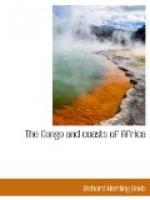[Illustration: The Deliverance.]
The river marched to the sea at the rate of four to five miles an hour. The Deliverance could make about nine knots an hour, so we travelled at the average rate of five miles; but for the greater part of each day we were tied to a bank while the boys went ashore and cut enough wood to carry us farther. And we never travelled at night. Owing to the changing currents, before the sun set we ran into shore and made fast to a tree. I explained how in America the river boats used search-lights, and was told that on one boat the State had experimented with a searchlight, but that particular searchlight having got out of order the idea of night travelling was condemned.
Ours was a most lazy progress, but one with the most beautiful surroundings and filled with entertainment. From our private box we looked out upon the most wonderful of panoramas. Sometimes we were closely hemmed in by mountains of light-green grass, except where, in the hollows, streams tumbled in tiny waterfalls between gigantic trees hung with strange flowering vines and orchids. Or we would push into great lakes of swirling brown water, dotted with flat islands overgrown with reed grass higher than the head of a man. Again the water turned blue and the trees on the banks grew into forests with the look of cultivated, well-cared-for parks, but with no sign of man, not even a mud hut or a canoe; only the strangest of birds and the great river beasts. Sometimes the sky was overcast and gray, the warm rain shut us in like a fog, and the clouds hid the peaks of the hills, or there would come a swift black tornado and the rain beat into our private box, and each would sit crouched in his rain coat, while the engineer smothered his driving-rods in palm oil, and the great drops drummed down upon the awning and drowned the fire in our pipes. After these storms, as though it were being pushed up from below, the river seemed to rise in the centre, to become convex. By some optical illusion, it seemed to fall away on either hand to the depth of three or four feet.
But as a rule we had a brilliant, gorgeous sunshine that made the eddying waters flash and sparkle, and caused the banks of sand to glare like whitewashed walls, and turn the sharp, hard fronds of the palms into glittering sword-blades. The movement of the boat tempered the heat, and in lazy content we sat in our lookout box and smiled upon the world. Except for the throb of the engine and the slow splash, splash, splash of the wheel there was no sound. We might have been adrift in the heart of a great ocean. So complete was the silence, so few were the sounds of man’s presence, that at times one almost thought that ours was the first boat to disturb the Congo.




